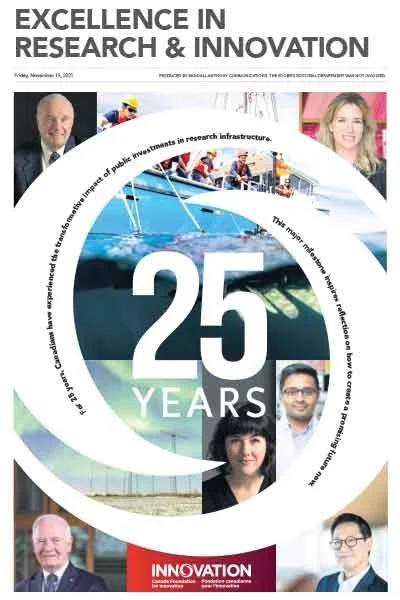Canadore College, headquartered in North Bay, Ontario, has a proven track record with innovative applied research specifically designed to meet the needs of industry. Now it’s about to expand on that reputation and move into the realm of delivering reliable and safe drinking water systems to Indigenous communities. As part of its Clean Water Initiative, Canadore is creating a Clean Water Learning Lodge on its College Drive Campus to develop a comprehensive platform of products, services and education programs. The outcomes will include programs tailored to the needs and values of First Nations, and will inspire Indigenous learners to take on fulfilling careers in water management.
Read MoreIn sudden cardiac arrest, every minute that passes before the heart is restarted counts. When the brain is deprived of oxygen for more than four to six minutes, the risk of irreparable damage increases exponentially.
Read MoreThe last two years have produced a seismic shift in the economy, the labour market, and the values and structures underpinning our working lives. The COVID-19 pandemic destabilized many established workforce systems, and what has emerged out of these upheavals is a much different reality for employees and employers alike.
Read MoreFrom infrastructure and machinery to technology and health, many of the fundamentals of our modern life rely on metals and minerals.
Canada has long been recognized as a leading mining nation and host to a minerals sector that continuously advances exploration, mining and related support activities. In producing 60 minerals and metals, the industry continues to drive job creation and economic activity in every region, yet it has also been subject to a number of changes over the past decade.
Read More“For the Mamalilikulla First Nation, every day is Ocean Day,” says John Powell, chief councillor of the traditional land and waters of the Gwaxdlala/Nalaxdlala (Lull Bay/Hoeya Sound). “Every day is land day. Every day is sky day. Every day, we connect to our ancestors and the stories that bind us to the reason that we created an IPCA under our ancient traditional law of Aweenak’ola.”
Read MoreWater plays a central role in every aspect of society, from health and food security to economic development. Disruptions to water supplies – for example, due to the floods, droughts or wildfires that happen with increasing frequency across Canada and the world – should serve as wake-up calls and inspire action.
Read MoreHealth crises tend to reveal health inequities and health-care gaps. The COVID-19 pandemic, for example, illustrated the need to make Canada’s health systems more resilient, find a way to efficiently mobilize and integrate new knowledge, and actively engage community partners, especially those representing marginalized and underserved populations.
Read MoreAs we step into the future, we have learned that nothing is certain except change itself. The good news: when you build a great workplace for all, every organization can rise to meet the challenge of tomorrow.
Read MoreOur overarching goal – to address climate change – is more critically important than ever. Yet recent events, such as the coronavirus pandemic and the war in Ukraine, have brought other key components of the clean economy into focus, food and energy security among them.
Read MoreTwo years ago, on Earth Day 2020, 220 members of Canada’s Clean50 and 180 companies issued a call for adoption of a comprehensive “build-back-better” plan that included a strong focus on supporting the companies and innovations paving the way for a clean economy. This plan was then endorsed by 35 environmental non-governmental organizations. Today, Gavin Pitchford, Canada’s Clean50 Awards executive director and the CEO of Delta Management Group, is happy to report that progress has been made
Read MoreIn family-owned businesses, balancing the interests of the business with those of the family can become complicated, and in some cases, a source of family challenges.
Read MoreMore and more, consumers want to know that their food is ethically produced with minimal impact on the environment while still being affordable. Recent research confirms a growing interest of Canadians in improving the food system as a whole – with emphasis on sustainability and transparency.
Read MoreThe coronavirus pandemic has brought Canada’s health system to the brink, deepening cracks and highlighting issues that have long been evident.
Read MoreThe discussion about cancer care in Indigenous communities has changed significantly in the 10+ years since Warren Clarmont, a member of the Gitanmaax Band of the Gitxsan First Nation, was diagnosed with testicular cancer.
Read MoreTwo years ago, Brenda O’Reilly’s four restaurants in St. John’s, Newfoundland, were on a growth trajectory – until the coronavirus pandemic brought everything to a hard stop. The closing date, March 16, 2020, is especially memorable since it was the day before St. Patrick’s Day, which is traditionally one of the busiest days for O’Reilly’s Irish Newfoundland Pub.
Read MoreOn the first weekend after the mid-November floods across British Columbia, their ripple effects reached a Vancouver area farmers market. Empty stalls served as a reminder of the farmers affected by the extreme weather event and shoppers seemed anxious about potential food shortages. Yet there was also a tremendous outpouring of support.
Read MoreSFU elevates its commitments on climate action to a new level
Recognized for its sustainability leadership among universities worldwide, Simon Fraser University (SFU) is raising the bar once again. On October 19, 2021, SFU announced it has joined the United Nations-backed Race To Zero campaign – a global alliance of universities, businesses and investors, cities and regions, and other institutions committed to achieving net-zero carbon emissions by no later than 2050.
Read MoreToday, November 19, 2021, we published our LARGEST EVER Globe and Mail special feature: a 28-page behemoth that celebrates the 25th anniversary of one of our longstanding partners, The Canada Foundation for Innovation.
Read MoreFrom regional impacts to providing insights valued worldwide
Saskatchewan is known as the “land of living skies.” Appropriately, the University of Saskatchewan (USask) is home to a research program focused on the outer reaches of our atmosphere.
Read More



















